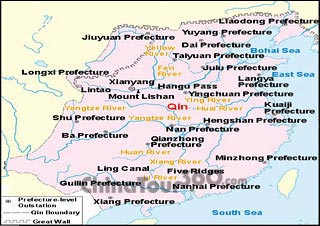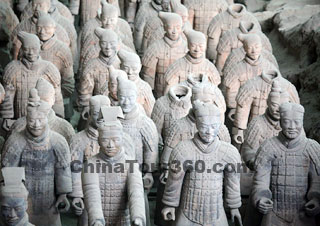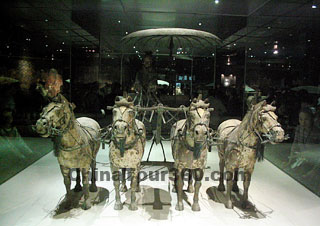 |
| Qin Dynasty Map |
After subjugating the six other major states of the Eastern Zhou through wars between 230BC and 221BC, the King of Qin State, Yingzheng (Qin Shi Huang - the first emperor of the Qin Dynasty) built up the Qin Dynasty (221BC-206BC) - the first unified, multi-national, despotic and power-centralized state in Chinese history. He made Xianyang (a city near Xian in Shaanxi Province) his capital city.
The Qin Dynasty was a short dynasty with a span of only 15 years. However, it generated a 2,000-year-long imperial history in China and exerted a far-reaching influence on the dynasties that followed. Since the unification, Qin's territory has been kept fairly intact up to today except for frontiers in the west, southwest and northeast.
To fend off barbarian intrusion and protect the northern frontier, Emperor Qin ordered the construction of the Great Wall (the Great Wall commonly referred to at the present-day is actually four great walls rebuilt or extended during the Western Han, Sui, Jin, and Ming Dynasties, rather than a single, continuous wall). Another wonder of the world left in the Qin Dynasty must be the immense and monumental Terracotta Warriors of Emperor Qin's Mausoleum, a creation of both blood and tears. The two wonders are witnesses to the ancient Chinese people's wisdom and originality.
|
|
Emperor Qin instituted centralism and a strict set of rules by which people lived under great oppression. He ruled as a despised tyrant despite all his achievements. The emperor imposed heavy taxes and constrained thousands of people to work on the Great Wall. In order to unify human thoughts, he commanded that many Confucian scholars be banished or put to death and he burned most of their books to prevent freethinking.
In the Qin Dynasty, the system of private land ownership was carried out. The government put much attention on agriculture, because the foreign wars were mostly supported by agriculture production, and lands were also parts of the military award. At the same time, the government unified and standardized the system of metrology, the currency, etc which promoted the development of the feudal economy.
Under the great oppression, several peasant uprisings broke out. The most influential one was the uprising led by Chen Shend and Wu Guang, which, although failed at last, greatly aroused people's detestation toward the Qin government. Finally, in 207 BC Liu Bang (the first emperor of the Han Dynasty) attacked Xianyang, the capital of Qin, thus putting an end to the disreputable Qin Dynasty.
![]() Go to the Han Dynasty
Go to the Han Dynasty









